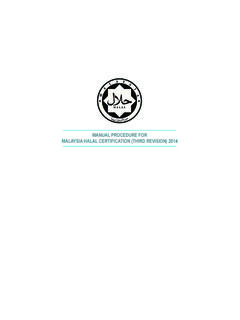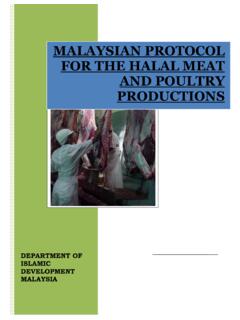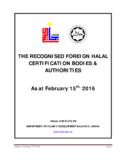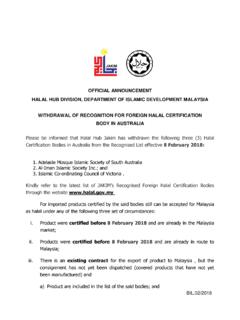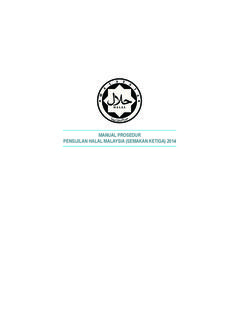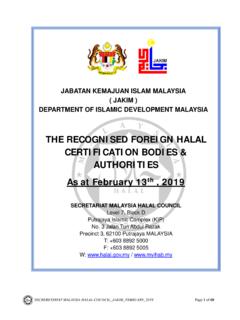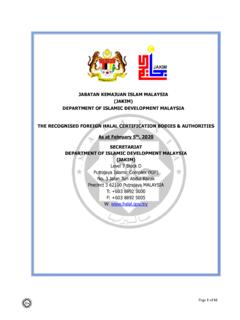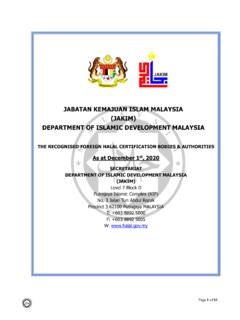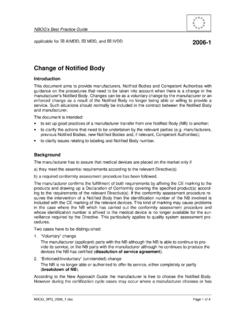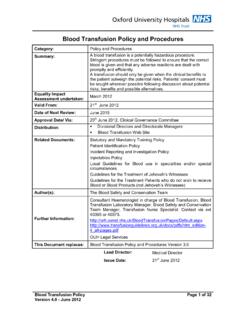Transcription of Halal Assurance System
1 DEPARTMENT OF ISLAMIC DEVELOPMENT. MALAYSIA. GUIDELINES FOR Halal . Assurance . MANAGEMENT System . of MALAYSIA Halal CERTIFICATION. 2. GUIDELINES FOR Halal Assurance MANAGEMENT System . OF MALAYSIA Halal CERTIFICATION. Halal HUB DIVISION. G FLOOR, BLOCK 2200, ENTERPRISE BUILDING 3, PERSIARAN APEC 63000 CYBERJAYA, SELANGOR. 3. CONTENT. 1. Introduction&&&&&&&&&&&&&&&&&&&&&&&&.&.. 4. 2. Terms and Definitions&&&&&&&&&&&&&&&&&&&&.&.4. 3. General Principles&&&&&&&&&&&&&&&&&&&&&&&5. 4. Internal Halal Committee &&.&&&&&&&&&&&&&&&&&..6. 5. Training Program&&&&&&&&&&&&&&&&&&&&&&&..6. 6. Principles of Halal Assurance Management System &&&..6. 7. Development of Recall product Procedure&&&&&&&&&&&&.8. 8. traceability &&&&&&&&&&&&&&&&&&&&&&&&&&8. APPENDIX 1. Flowchart of General Principles of Halal Assurance Management&&&&&..10.
2 APPENDIX 2. List of Halal Requirement References&&&&&&&&&&&&&&&&&..11. Acknowledgement 4. GUIDELINES FOR Halal Assurance MANAGEMENT System . OF MALAYSIA Halal CERTIFICATION. 1. INTRODUCTION. This guideline promotes the adoption of systems when developing, implementing and improving the effectiveness of controlling Halal purity and genuineness. This guideline shall be used by Halal certificate holder to fulfill Halal standards, regulations and requirements in Halal certification. This guideline sets out the principles of a Halal Assurance System and its application. It's provides a systematic approach to ensure and preserve Halal integrity of products. This is based on the concept of effective quality management System throughout the supply chain. This guideline describes practical approach for organizations which have obtained or intend to obtain Halal certification from competent authorities in Malaysia.
3 This guideline shall be read together with the documents listed in Appendix 2 or any relevant Halal standards or requirements issued by competent authorities. The System suppose to be as an internal mechanism in Halal monitoring, controlling, improving and preventing any non-compliance in producing Halal products. The manufacturer is responsible for developing and managing the Halal Assurance System to ensure compliance of the entire supply chain process with the requirements set by the competent Halal authority. TERMS AND DEFINITIONS. For the purpose of this guideline, the following terms and definitions are been use : Internal Halal Committee (IHC). A committee established by the organizations to be responsible for developing, monitoring and controlling the Halal Assurance System to ensure its effectiveness.
4 Internal Halal Committee Meeting 5. A meeting involving all Halal internal committee members to discuss on issues related to the development, implementation, maintenance and review of Halal Assurance Management System . Documentation Any record of Halal Assurance Management System activity. Control Measure. Any action and/or activity required to control and/or eliminate Halal threats. Corrective Action Any action to be taken when the results of monitoring at the IHC indicate a loss of control. Non Compliance The absence of and/or the failure to fulfill requirement of any Halal standards or guidelines. Contamination A general term to describe the state of being contaminated, either by contaminant or precursor which affects the Halal status. traceability The ability to verify the history, location or application of an item by means of documented recorded identification .
5 The elements of traceability include of product , process and customer traceability . Halal Critical Point (HCP). Critical points in the whole Halal supply chain which if identified, controlled and monitored can eliminate the possibility of Halal non compliance Verification The use of methods or procedures in addition to those used in monitoring to determine if the Halal Assurance System is in compliance or the System needs modification and revalidation. 3. GENERAL PRINCIPLES. A development of an effective Halal Assurance management System which is focus on minimizing and eliminate the non conformance of Halal requirement. The emphasis of the Halal Assurance management System is via the identification of Halal Critical Points (HCP) within the entire supply chain with constant control, monitoring and verification.
6 The Halal Assurance management System should include: 6. a. Effective product recall procedure;. b. Effective documentation to enable traceability ;. c. Proper filing System for Halal applications, documents, procedures and records which shall be made available for audit by competent authorities. 4. INTERNAL Halal COMMITTEE (IHC). The Internal Halal Committee (IHC) shall consist of at least four (4). members where: a. two (2) of them must be Muslim at management level;. b. one (1) person shall be responsible for purchasing/procurement;. c. The employee responsible for managing Halal matters for the company shall be the coordinator of the IHC;. d. for slaughter house/abattoir, Halal Supervisor shall be a member of the committee. The committee members must be knowledgeable and well trained in Halal standard and Halal certification requirements.
7 The Management shall ensure that terms of reference of the IHC are fully established. The effectiveness of the IHC in implementing the Halal Assurance Management System shall be reviewed periodically, at least once every year. An immediate review is necessary when controls are ineffective. A. review may be necessary when any of the following occurs: a. Change in the IHC;. b. Changes are made to the monitoring schedules; and c. Change in the operations and/or supply chain. 5. TRAINING PROGRAM. The management shall provide adequate and continuous training for management members and relevant employees on the Malaysian Halal standards and certification requirements. Periodic assessments shall be conducted to ensure relevant employees have been trained to have sufficient knowledge to effectively deliver their roles and responsibilities.
8 6. PRINCIPLES OF Halal Assurance MANAGEMENT System . The following are important principles for the IHC to focus on when implementing the Halal Assurance Management System : 7. DETERMINATION OF Halal CRITICAL POINTS. The IHC shall determine all possible sources of contamination ( Halal critical points) throughout the supply chain that can lead to non compliance to Halal standard requirements DEVELOPMENT AND VERIFICATION OF FLOW CHART. The IHC shall develop appropriate flow charts which consists of all steps involved in the entire supply chain committee shall verify the steps in the flow charts against the actual operations by conducting on- site inspections. The flow charts can be used as tools for the IHC to identify the potential Halal threats and implement the appropriate control measures to ensure compliance with syariah requirements.
9 IMPLEMENTATION OF CONTROL MEASURES. In the event Halal threats are found at any stage of the Halal supply chain process, the IHC shall determine appropriate control measures to be taken. The control measures taken shall be in accordance with Malaysian Standard or any relevant Halal requirements, where applicable. DEVELOPMENT OF CORRECTIVE ACTIONS. Corrective actions have to be developed whenever monitoring indicates non compliance has occurred. Corrective actions taken shall preserve the Halal integrity of the products or processes. The IHC shall ensure that the corrective actions are implemented as planned and goods produced during which period the corrective actions are not implemented are to be handled according to established procedures. Appropriate procedures must be established to prevent recurrence of similar incidence and to bring the process or System back into control.
10 A proper record shall be maintained to document the non compliance incidence which includes the product description, description of the non compliance and the corrective actions / control measures taken. This record may include : a. review of non conformities;. b. review of trends in monitoring results that may indicate trend of lost of control;. c. the cause(s) of non-conformity;. d. forward action to ensure that non conformities will not recur;. e. record of the results of corrective actions taken; and f. assessment on the effectiveness of the corrective actions taken. 8. DOCUMENTATION System AND MANAGEMENT OF RECORDS. It is important that the IHC establishes and maintains an effective documentation and record-keeping System to provide evidence of conformity to the requirements and effective implementation of Halal Assurance Management System .
